Nachdem wir jahrelang WordPress-Websites erstellt haben, haben wir gelernt, wie wichtig es ist, eine lokale WordPress-Einrichtung auf Ihrem Computer zu haben.
Mit WordPress auf Ihrem persönlichen Rechner können Sie mit neuen Funktionen experimentieren, ohne Ihre Live-Site zu gefährden, tief in die WordPress-Entwicklung eintauchen und sogar ganze Websites erstellen, bevor sie live gehen. Es ist wie eine private Sandbox für alle Ihre WordPress-Projekte.
Als Windows-Benutzer gibt es zahlreiche Möglichkeiten, WordPress lokal einzurichten. Wir haben uns jedoch auf die zwei einfachsten Methoden beschränkt. In dieser Anleitung zeigen wir Ihnen, wie Sie WordPress ganz einfach auf einem Windows-Computer installieren können, unabhängig davon, welche Version Sie verwenden.
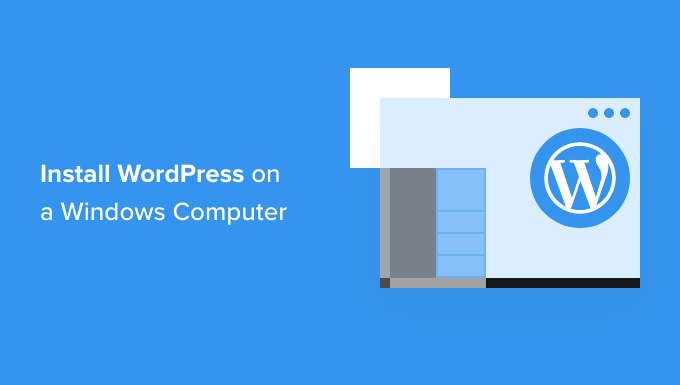
Warum sollten Sie WordPress unter Windows installieren?
Wenn Sie ein Windows-Benutzer sind, dann bietet die lokale Installation von WordPress auf Ihrem Computer mehrere Vorteile.
Eine lokale WordPress-Installation schafft eine Testumgebung, die sich nicht auf Ihre Live-Website auswirkt. Diese Einrichtung, die oft als lokaler Server oder localhost bezeichnet wird, ist Ihr persönlicher Spielplatz für WordPress.
WordPress-Entwickler verwenden regelmäßig lokale Installationen für ihre Arbeit. Zum Beispiel können sie damit mit neuen Plugins oder Themes experimentieren oder die Website vor dem Update auf den Gutenberg-Blockeditor testen.
Aber das ist nicht nur etwas für Profis. Wenn Sie WordPress noch nicht kennen, ist eine lokale Installation perfekt zum Lernen. Sie können Funktionen erkunden, Themes und Plugins testen und frei experimentieren, ohne sich Sorgen machen zu müssen, dass eine Live-Site kaputt geht.
Es ist wichtig zu wissen, dass bei einer lokalen Installation von WordPress unter Windows nur Sie die Website sehen können. Wenn Sie eine öffentliche Website erstellen möchten, benötigen Sie einen Domainnamen und Webhosting.
Technisch gesehen können Sie WordPress unter Windows mit XAMPP installieren, und wir haben bereits eine Anleitung dazu geschrieben.
Wir haben jedoch 2 noch einfachere Methoden als XAMPP gefunden, um eine lokale WordPress-Umgebung einzurichten. Sie eignen sich hervorragend für Anfänger oder Benutzer, die schnell eine lokale Website erstellen müssen. Sie können auf den unten stehenden Link klicken, um zu der jeweiligen Methode zu springen, die Sie interessiert:
Methode 1: WordPress unter Windows mit Studio installieren (schnell und einfach)
Für die erste Methode werden wir Studio verwenden. Dabei handelt es sich um eine lokale WordPress-Software von Automattic, dem Unternehmen, das WordPress.com verwaltet und betreibt, einen Website-Builder, der auf der WordPress-Software basiert.
Wir werden zuerst über diese Methode sprechen, weil sie viel schneller und einfacher zu befolgen ist, was sie perfekt für absolute Anfänger macht.
Zunächst müssen Sie die Website Studio by WordPress.com öffnen. Klicken Sie dann auf die Schaltfläche “Download für Windows”.
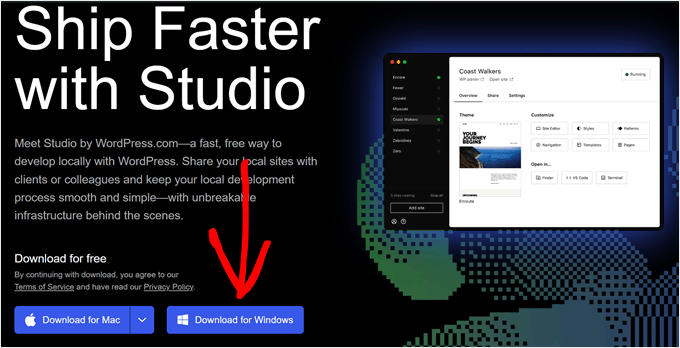
Öffnen Sie dann einfach die heruntergeladene Datei, um die Installation zu starten.
Es erscheint nun ein Popup-Fenster, das Ihnen anzeigt, dass die Anwendung installiert wird.
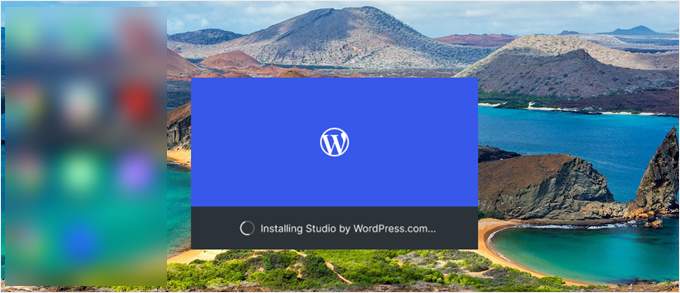
Danach können Sie Ihre erste Website hinzufügen.
Geben Sie dazu einfach den Namen Ihrer neuen lokalen WordPress-Site ein und klicken Sie auf “Site hinzufügen”. Sie können die Website benennen, wie Sie wollen, solange Sie sie leicht identifizieren können.
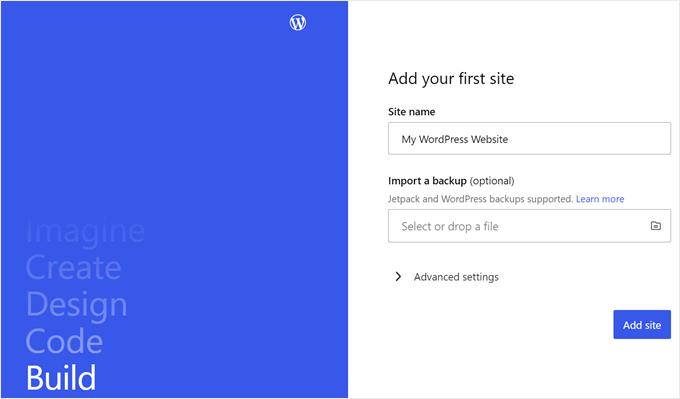
Sie sollten nun das Dashboard Ihrer lokalen WordPress-Website sehen.
Um auf Ihr WordPress-Dashboard zuzugreifen und Ihre Website zu bearbeiten, klicken Sie einfach auf die Schaltfläche “Start” in der oberen rechten Ecke. Dadurch wird Ihre lokale Website für Sie auf Ihrem Computer zugänglich.
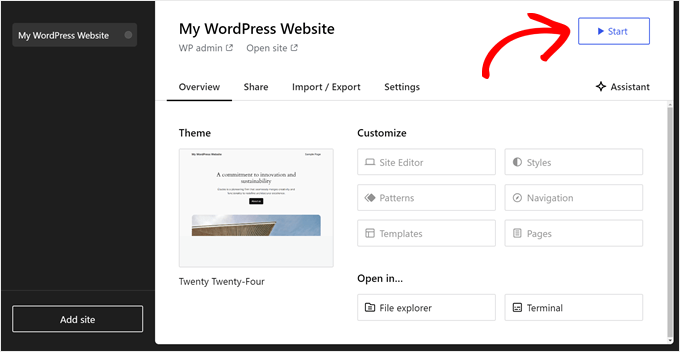
Sobald die Schaltfläche “Start” auf “Läuft” wechselt, können Sie auf den Link “WP Admin” oben links auf der Seite klicken.
Dies bringt Sie zu Ihrer lokalen WordPress-Verwaltungsseite.
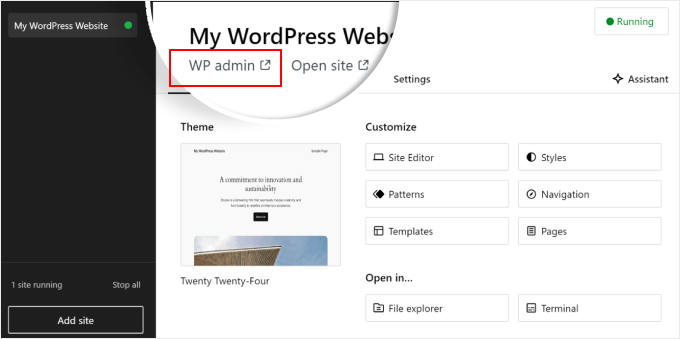
Und das war’s dann auch schon mit der Einrichtung. Sehen wir uns nun die anderen Einstellungen an, die beim Aufbau Ihrer lokalen Website erforderlich sein können.
Wie Sie auf der Registerkarte “Übersicht” sehen können, haben Sie direkt vom Studio-Dashboard aus Zugriff auf das Menü des WordPress-Vollseiteneditors. Sie können auch auf “Datei-Explorer” klicken, um die Ordner und Dateien Ihrer WordPress-Website zu öffnen, und auf “Terminal” klicken, um Ihre Website mit WP-CLI zu verwalten.
Wenn Sie zur Registerkarte “Freigeben” wechseln, können Sie sich bei Ihrem WordPress.com-Konto anmelden, Ihre lokale Website klonen und sie auf die Server von WordPress.com hochladen. Dadurch wird die geklonte Website vorübergehend online gestellt, was für die gemeinsame Nutzung von Demoseiten mit Ihren Kunden oder Teammitgliedern nützlich ist.
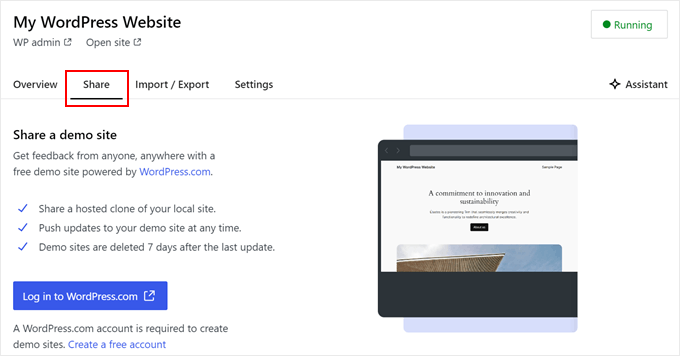
Es kann vorkommen, dass Sie sich direkt über Ihren Browser bei Ihrer lokalen Website anmelden möchten, anstatt Studio zu verwenden. In diesem Fall müssen Sie Ihre wp-admin-Anmeldedaten kennen.
Um sie zu finden, können Sie zur Registerkarte “Einstellungen” wechseln und dort Ihren WordPress-Administrator-Benutzernamen, Ihr Passwort und Ihre Anmelde-URL finden.
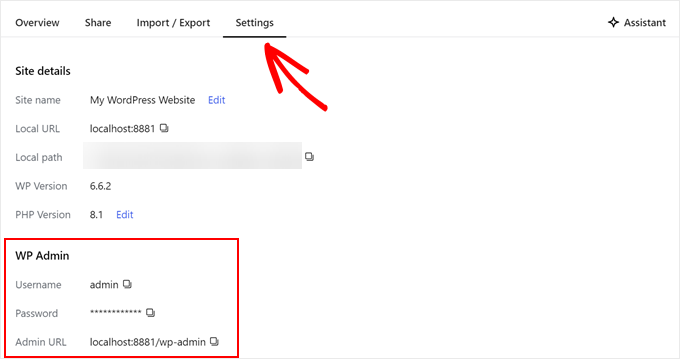
Eine weitere nützliche Funktion von Studio ist der integrierte KI-Chatbot, mit dem Sie kommunizieren können, indem Sie auf die Schaltfläche “Assistent” klicken.
Hier können Sie Studio um Hilfe bei Aufgaben wie der gleichzeitigen Aktualisierung aller Ihrer Plugins, der Aktualisierung Ihrer WordPress-Kernversion oder der Erstellung von Code für einen benutzerdefinierten Block bitten.
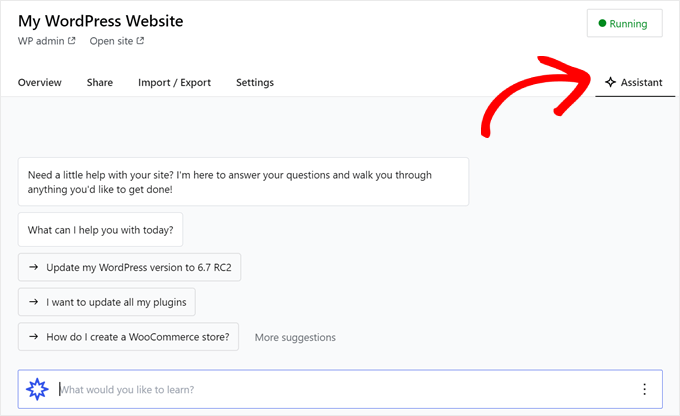
Wenn Sie mit der Arbeit an Ihrer lokalen Website fertig sind, bewegen Sie den Mauszeiger einfach über die Schaltfläche “Laufend” in der oberen rechten Ecke, bis dort “Stopp” steht.
Klicken Sie dann auf die Schaltfläche, um die Website zu beenden.
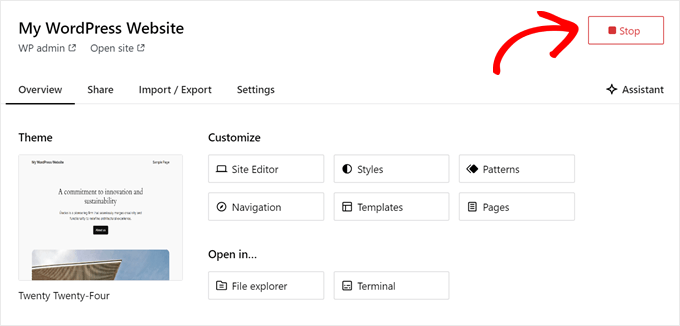
Ein Nachteil von Studio ist, dass Sie die WordPress-Umgebung nicht nach Ihren Wünschen konfigurieren können. Das bedeutet, dass Sie die PHP-Version, den Webserver und die Datenbank verwenden müssen, die für Sie vorausgewählt wurden.
Dies kann ein Nachteil sein, wenn Sie Ihre Website oder Ihr Plugin mit bestimmten Serverkonfigurationen testen müssen.
Wenn Sie mehr Kontrolle über Ihre lokale WordPress-Umgebung benötigen oder Ihr lokales Setup an eine bestimmte Live-Server-Konfiguration anpassen müssen, können Sie die nächste Methode mit Local WP ausprobieren.
Methode 2: WordPress unter Windows mit lokalem WP installieren (besser anpassbar)
Zunächst müssen Sie die Local WP-Software herunterladen und auf Ihrem Windows-Computer installieren. Gehen Sie einfach auf die Local WP-Website und klicken Sie auf die Schaltfläche “Download for Free”.
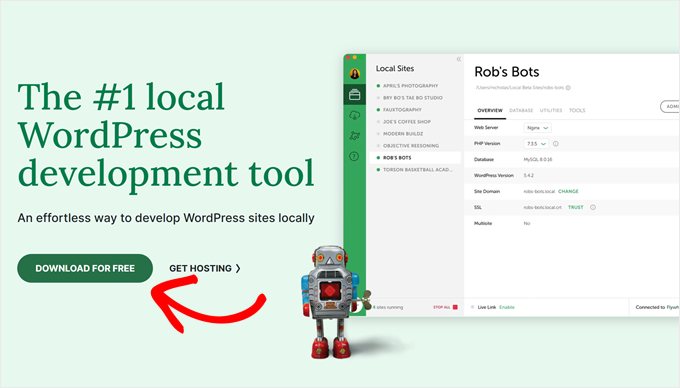
Daraufhin erscheint ein Popup-Fenster, in dem Sie Ihre Plattform auswählen müssen. Wählen Sie “Windows” aus dem Dropdown-Menü.
Als Nächstes können Sie Ihre Daten wie Vor- und Nachname, Arbeits-E-Mail-Adresse und Telefonnummer eingeben, um die Software herunterzuladen.
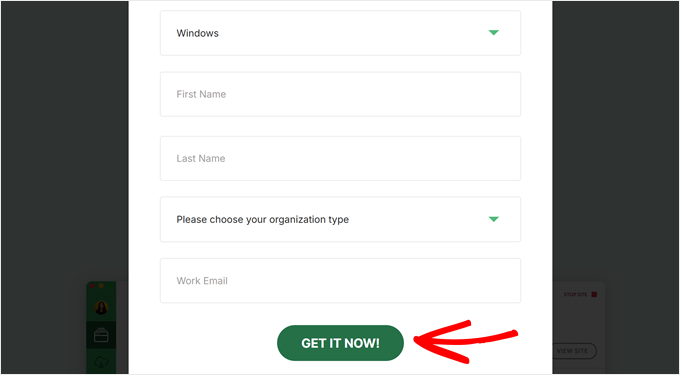
Nach Eingabe der Daten klicken Sie einfach auf die Schaltfläche “Jetzt anfordern”.
Danach wird die Software automatisch auf Ihren Computer heruntergeladen. Andernfalls können Sie auf den Link “Hier klicken” klicken, um den Download zu starten.
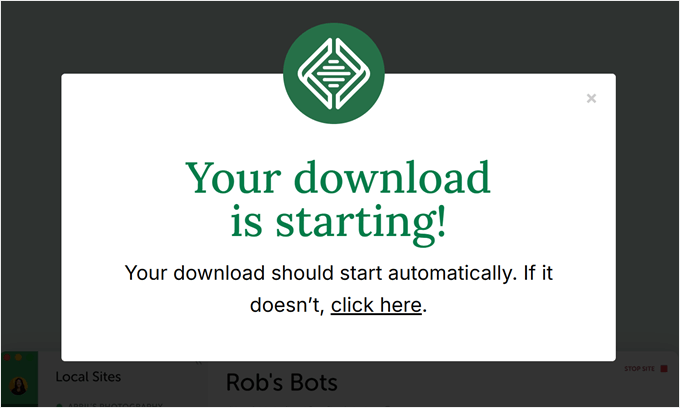
Sobald die Datei heruntergeladen ist, starten Sie den Einrichtungsassistenten.
Nun müssen Sie auswählen, ob Sie die Software für alle Benutzer oder nur für sich selbst installieren möchten.
Sobald Sie eine Option ausgewählt haben, klicken Sie auf die Schaltfläche “Weiter”.
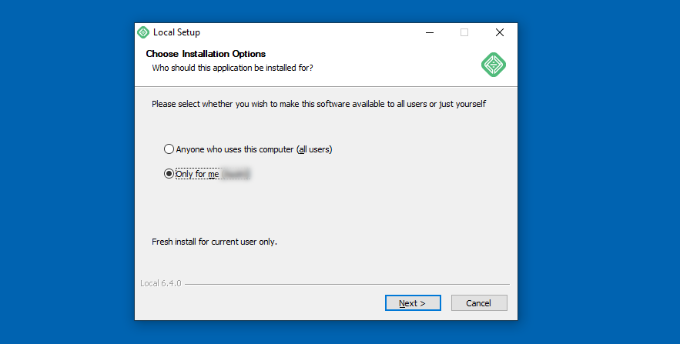
Im nächsten Schritt können Sie den “Zielordner” auswählen, in dem die Software installiert werden soll.
Klicken Sie einfach auf die Schaltfläche “Durchsuchen”, um den Pfad festzulegen, und klicken Sie dann auf die Schaltfläche “Installieren”.
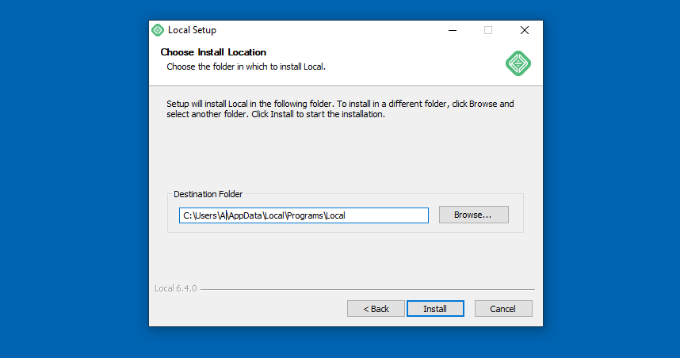
Die Local WP-Software wird nun auf Ihrem Windows-Computer installiert.
Anschließend können Sie das Kontrollkästchen “Lokal ausführen” aktivieren und im Einrichtungsassistenten auf die Schaltfläche “Fertig stellen” klicken.
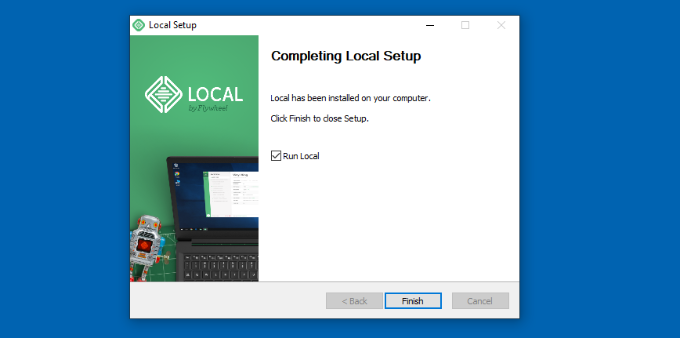
Die Software wird nun auf Ihrem Windows-Gerät gestartet.
Der nächste Schritt besteht darin, eine neue lokale Website hinzuzufügen. Klicken Sie dazu einfach auf das Pluszeichen “+” am unteren Rand.
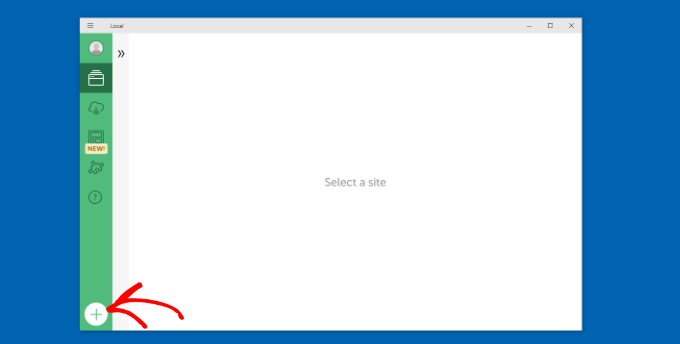
Danach können Sie eine Website in der lokalen Software erstellen.
Wählen Sie die Option “Neue Website erstellen” und klicken Sie auf die Schaltfläche “Weiter”. Es gibt auch die Möglichkeit, die Website aus einer Blaupause oder einer bestehenden Website-Datei zu erstellen, aber zur Veranschaulichung entscheiden wir uns für die erste Option.
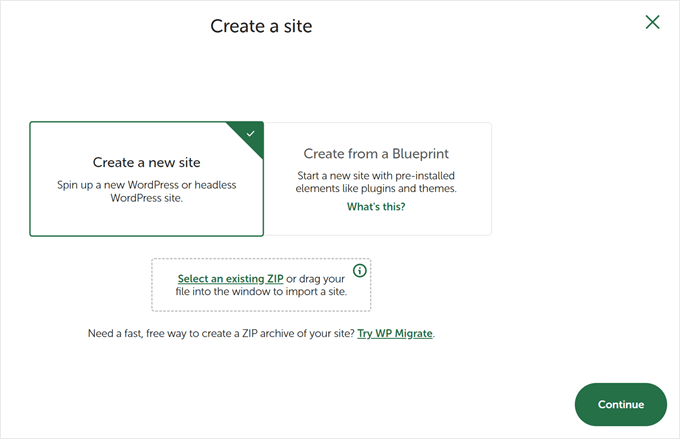
Als nächstes können Sie einen Namen für Ihre lokale Website eingeben, z. B. “Meine WordPress-Website”.
Es gibt auch erweiterte Optionen, bei denen Sie die lokale Website-Domäne und den lokalen Website-Pfad eingeben können. Standardmäßig wird für die Domain der Titel Ihrer Website verwendet, jedoch mit Bindestrichen getrennt.
Wenn Sie fertig sind, klicken Sie einfach auf die Schaltfläche “Weiter”.
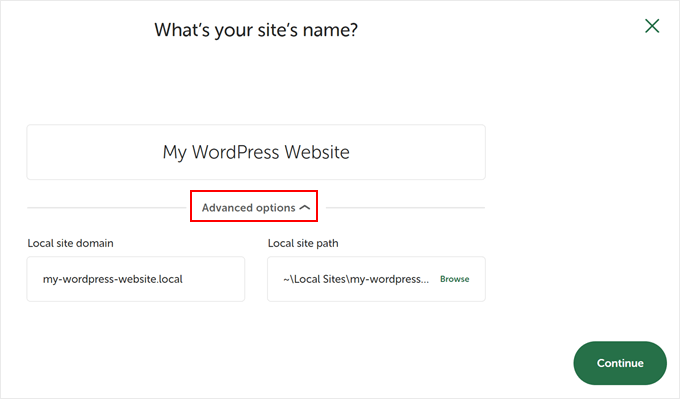
Danach müssen Sie eine Umgebung für Ihre lokale Website auswählen.
Sie können die “bevorzugte” Umgebung verwenden, in der die Software automatisch die PHP-Version, den Webserver und die MySQL-Version auswählt. Andererseits können Sie auch “Benutzerdefiniert” wählen und die Umgebungsdetails eingeben.
Local WP bietet die neuesten PHP-Versionen. Als Webserver können Sie zwischen Nginx und Apache wählen. Auch bei den Datenbanken können Sie zwischen MySQL und MariaDB wählen.
Beachten Sie, dass einige PHP-, Webserver- und Datenbankversionen das Herunterladen bestimmter Abhängigkeiten erfordern, damit sie ordnungsgemäß funktionieren.
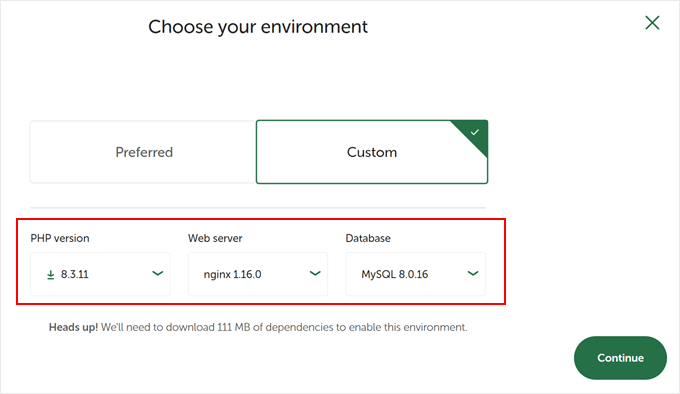
Als nächstes können Sie einen WordPress-Benutzernamen und ein Passwort für Ihre lokale Website eingeben. Außerdem haben Sie die Möglichkeit, eine WordPress-E-Mail-Adresse auszuwählen, an die Sie alle E-Mail-Benachrichtigungen erhalten werden.
Darüber hinaus gibt es eine erweiterte Option, bei der die Software fragt, ob Sie ein WordPress-Multisite-Netzwerk haben. Wenn nicht, klicken Sie einfach auf “Nein”.
Nachdem Sie diese Angaben eingegeben haben, klicken Sie einfach auf die Schaltfläche “Website hinzufügen”.
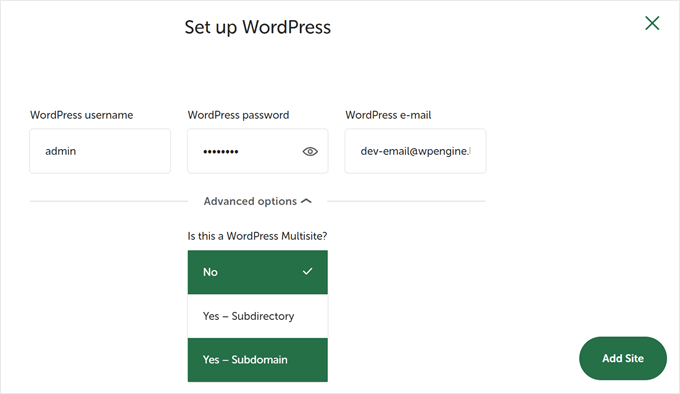
Die Software wird nun WordPress installieren und Ihre Website einrichten.
Um die lokale Website zu starten, klicken Sie auf die Schaltfläche “Website starten” in der oberen rechten Ecke.
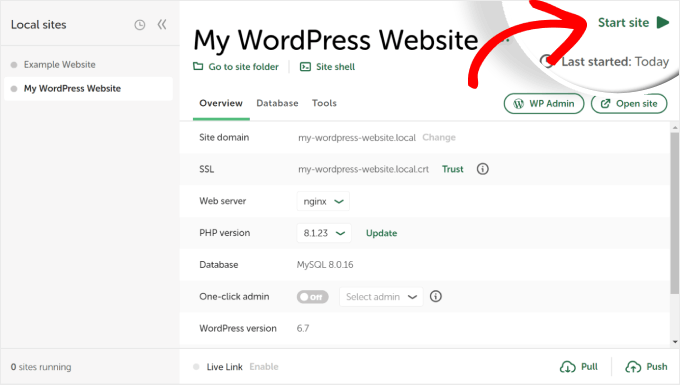
Klicken Sie als Nächstes auf die Schaltfläche “WP Admin”, um die Anmeldeseite für den WordPress-Admin anzuzeigen.
Geben Sie einfach den Benutzernamen und das Kennwort ein, die Sie zuvor bei der Einrichtung der lokalen Website eingegeben haben, und klicken Sie dann auf die Schaltfläche “Anmelden”.
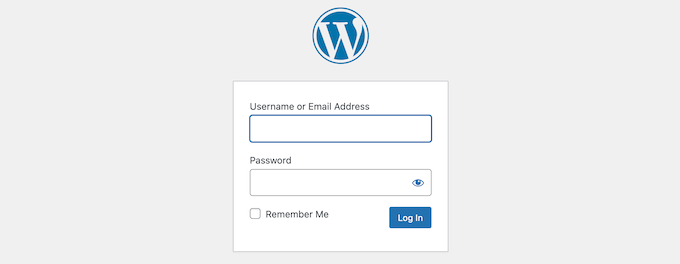
Sie können nun Ihre lokale Website auf Ihrem Windows-Computer bearbeiten.
Wenn Sie fertig sind, vergessen Sie nicht, die Website von der Local WP Software zu stoppen, indem Sie auf die Schaltfläche “Stop site” klicken.
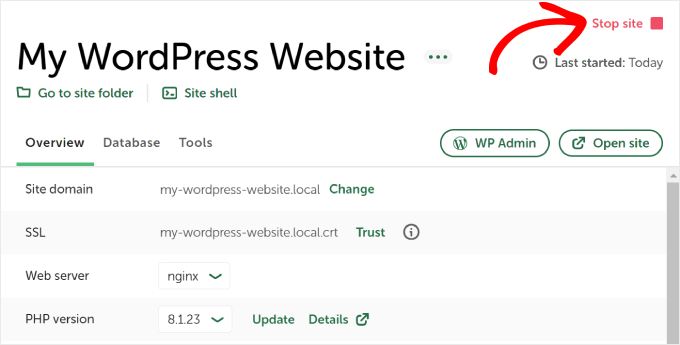
Pro-Tipp: Wenn Sie den Anmeldevorgang überspringen möchten, können Sie in Local WP einen Ein-Klick-Admin-Login aktivieren.
Gehen Sie dazu einfach zurück zum Local WP Dashboard und schalten Sie die Schaltfläche “One-click admin” auf “On”. Wählen Sie dann im Dropdown-Menü den Admin-Benutzer aus, der diese Ein-Klick-Login-Funktion nutzen kann.
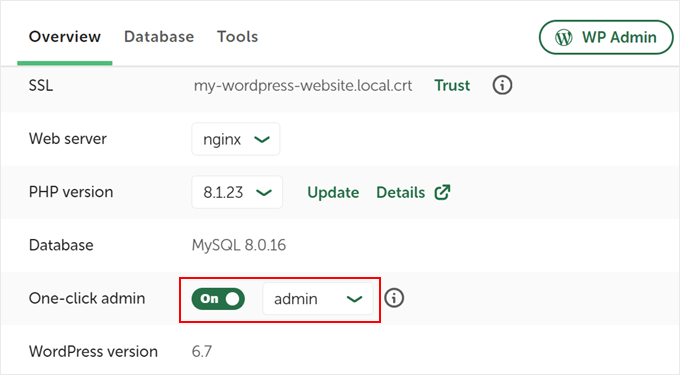
Alternative: Verwenden Sie WordPress Playground, um Themes, Plugins und mehr zu testen
WordPress Playground ist ein innovatives Tool, mit dem Sie direkt in Ihrem Webbrowser mit WordPress experimentieren können. Es ist ein virtueller Sandkasten, in dem Sie neue WordPress-Themes, Plugins und Funktionen ausprobieren können, ohne eine reale Website zu beeinträchtigen.
WordPress Playground unterscheidet sich von einer lokalen WordPress-Umgebung in mehreren wichtigen Punkten.
Erstens muss es nicht auf Ihrem Computer installiert werden und wird im Gegensatz zu dauerhaften lokalen Installationen nach jeder Verwendung zurückgesetzt. Sie können von jedem Gerät mit einem Browser darauf zugreifen, während lokale Installationen an einen Computer gebunden sind.
Während WordPress Playground ideal für schnelle Tests und zum Lernen ist, bietet eine lokale WordPress-Umgebung auf Ihrem Windows-Computer mehr Flexibilität für langfristige Entwicklungsprojekte.
Eine ausführliche Anleitung finden Sie in unserem Leitfaden zur Verwendung von WordPress Playground in Ihrem Browser.
Ich habe WordPress auf meinem Windows-Computer installiert, was nun?
Jetzt, wo Sie WordPress auf Ihrem Computer haben, können Sie einige Dinge tun:
- Lernen Sie grundlegende WordPress-Tipps und -Tricks, um Ihre Website besser zu nutzen.
- Probieren Sie verschiedene WordPress-Themes aus, um zu sehen, wie Ihre Website aussehen kann.
- Installieren und testen Sie unverzichtbare WordPress-Plugins, um Ihrer Website neue Funktionen hinzuzufügen.
- Erfahren Sie, wie Sie häufige WordPress-Fehler selbst beheben können.
- Probieren Sie verschiedene Drag-and-Drop-Seitenerstellungsprogramme aus, um Ihre Website ansprechend zu gestalten.
- Erfahren Sie, wie Sie das WordPress-Administrator-Passwort auf localhost zurücksetzen, um den Zugang zu Ihrer Website wiederherzustellen.
- Richten Sie automatisierte Arbeitsabläufe ein, um die Verwaltung Ihrer Website zu erleichtern.
- Erfahren Sie mehr über die Sicherheit von WordPress, um Ihre Website vor Hackern zu schützen.
- Verschieben Sie Ihre lokale WordPress-Website auf einen Live-Server, wenn Sie sie für alle freigeben möchten.
Wir hoffen, dass dieser Artikel Ihnen geholfen hat, zu lernen, wie man WordPress lokal auf einem Windows-Computer installiert. Vielleicht interessieren Sie sich auch für unseren Artikel über die lokale Installation von WordPress auf einem Mac-Computer und unsere ultimative Anleitung zur Erstellung einer WordPress-Staging-Site.
Wenn Ihnen dieser Artikel gefallen hat, dann abonnieren Sie bitte unseren YouTube-Kanal für WordPress-Videotutorials. Sie können uns auch auf Twitter und Facebook finden.





Francesco
Hi,
Can I use this system to test a previous back up I did via the server control panel?
I have a zip file which is a mirror of my directory on the server, including database and WP-admin file.
I would line to test if the backup I have works fine and possible run it on a precioys version of the WP
WPBeginner Support
You would want to check with the tool you are using for the specifics but it should allow you to do what you’re wanting.
Admin
Melissa T
Installed WAMP and WordPress – thanks for the wonderfully detailed instructions! So now it’s time to create the web site — is there a guide on wpbeginner for that?
thank you!
WPBeginner Support
There are many different types of sites so there is no complete guide but for a starting point you may want to take a look at our article below. Step 3 and beyond in the guide should help.
https://www.wpbeginner.com/guides/
Admin
kwestyon
First, thank you so much for the guide! It’s working. Second, is there a way wherein after you create the website, would there a way to view the site after you clicked the published button. Sorry for the dumb question.
WPBeginner Support
If you are logged in, in the top right you should be able to open the dropdown that has your site title, and there you should find a link to view your site.
Admin
Yomi
Hello,
If I install WordPress on a localhost based on the content of this blog, will I be able to use plugins like woocommerce, elementor, astra & kadence?
Thank you.
WPBeginner Support
Yes, installing locally you would be able to use plugins and page builders like those on your site
Admin
Lisa
Hi,
I am at the point where I would put localhost/mysite/ in the browser. I am getting the “404 not found error”.
I named the copy of wordpress to wamp the same and have double checked the address to see if it’s typed in correctly. This still happens, what am I doing wrong?
Thanks!
WPBeginner Support
You would want to ensure you’re not running into the Skype error where it is trying to use port 80 while WAMP is.
Admin
WPBeginner Support
Currently, the WAMP website is down which is why we’ve added a different link and included a note above and are working on updating this article as quickly as we are able
Admin
mark
WAMP link redirects to a different site.
Faten
Hi team,
I followed the guide but when I go to local host/my site/ I have this error: your don’t have permission to access my site on this server.
Can you please help?
My folders are in this order: c/wamp/www folder/mysite, is that correct?
WPBeginner Support
That is the correct location, you would want to ensure WAMP is running when you see that specific error message.
Admin
Sam
Our published website was created using an older versions of WP, themes, and plugins. I would like to test against the latest versions of WP, themes, and plugins on a local PC installation.
If I backup the website data from the live online WP account using UpdraftPLus, can I restore the files on the local installation to test against the latest versions of WP, themes, and plugins?
If not, what is the most effective method to do so?
Thank you so much!
WPBeginner Support
You can do that or you could create a staging environment here:
https://www.wpbeginner.com/wp-tutorials/how-to-create-staging-environment-for-a-wordpress-site/
Admin
Jerelyn
Hi, the WampServer link (website) has not been working the past few days. Is there an alternative place to get it? Thanks.
WPBeginner Support
Not that we would recommend at the moment, hopefully, the issues on the site at the moment are resolved and the site starts working again soon.
Admin
Harry
I am trying to do the localhost/mysite/ part but every time I search this it says url not found how do I put the WordPress folder with the WAMP folder
WPBeginner Support
You would go to where you installed WAMP on your computer, and place the mysite folder inside the www folder
Admin
Jyoti
I installed WAMP and able to see a GREEN icon in system tray.
But i am not able to see anything when i click on that icon.No PHP database nothing at all.I uninstalled and reinstalled but didn’t work.
Would you please help?
thank you so much.
WPBeginner Support
You would normally want to enter localhost in your browser while the green W is in your icon tray to find that
Admin
Pete
I installed WampServer, but it wouldn’t run. All I saw was a couple of windows with command prompts briefly appear and then disappear.
WPBeginner Support
You should see the WAMP icon if you expand your icon tray in the bottom right
Admin
HSM
it happened with me, and solved it like that:
when entering the database name, and user name,
you may forgot and left the default password as written “Password”
(as happened with me)
without change it to a private password or at least remove the word “Password” and keep the field of password blank,
WPBeginner Support
Thanks for sharing the issue you ran into should others have this issue
Admin
Tracy De
Thanks for this. I was having trouble at this point. Have reinstalled everything and couldn’t work out what I was doing wrong.
Bain Dom
Can I install WordPress plugins in this WordPress on Windows 10 environment?
WPBeginner Support
Unless the plugin specifies otherwise(mainly plugins that connect to 3rd party services), you would be able to use plugins on a local installation
Admin
Chloe
Hi, I followed this guide a few weeks ago and set up the very beginnings of a test site. I now can’t remember or work out how to get back to editing the site! It’s maddening as I can launch WAMP, go to localhost/testsite/ and view the site I made but please can someone let me know how to enter editing mode!! Many thanks
WPBeginner Support
You would want to add /wp-admin to be able to log into your local installation of WordPress to be able to start editing it again
Admin
Kathleen
Thank you!!! Exactly what I needed to develop before making a site live
WPBeginner Support
You’re welcome, glad our guide could be helpful
Admin
Kathleen
Installed Wamp with no trouble thanks to your concise directions. However, after creating my database and starting the WP install I get this message:
“We were able to connect to the database server (which means your username and password is okay) but not able to select the ericajlester database.” I have been over and over checking everything to make sure the information is correct, but WP will not connect to the database. Any suggestions would be appreciated.
Thank you for such great information and support!
WPBeginner Support
The most common reason for this would be a typo in your database name, you would want to ensure the database information and prefix are both correct compared to what you have set
Admin
Alexis
Thank you so much!
WPBeginner Support
You’re welcome
Admin
Linda
Good job is done by Wpbeginner team!!!
Have a great day!
WPBeginner Support
Thank you, hope you have a great day as well
Admin
Daniel
Developing WP plugin for a client. Wanted to create a dev environment without paying for hosting space to do it. Thanks for the quick and dirty path to get there.
WPBeginner Support
Glad our article could help
Admin
Vic Iyke
This is a real life saver, thank you for the detailed instructions, it saved my time.
WPBeginner Support
Glad our guide was helpful
Admin
Erica
Thank you for the guidance..
WPBeginner Support
You’re welcome
Admin
Harish Nemade
After doing work on WordPress from WAMP, should we click on ‘Stop all services’?
WPBeginner Support
only if you wish to turn of WAMP and your local installation
Admin
Harish Nemade
The Website of WAMP which you had mentioned is not working anymore. The download is not responding from Sourceforge.net,
WPBeginner Support
From testing, the link is page is still working on our end, you may want to ensure this isn’t due to a browser or browser addon preventing your download.
Admin
Harish Nemade
Hey, I installed WAMP in the Internet Explorer folder, but once when I checked to search for my same localhost running on Explorer appeared in Chrome. But can I also Use the same Localhost from Chrome?
WPBeginner Support
If you installed your site in the wamp folder then you should be able to visit the site at localhost on any browser on that computer
kamodh singh
localhost/phpmyadmin not opening with any browser. when trying to open there are showing an error ( This site can’t be reached – ERR_CONNECTION_RESET )
How can i fix this error plz tell me .
thanks…
WPBeginner Support
If you’ve shut down your computer since the last time you used WAMP you would want to ensure it is running before visiting localhost.
Admin
Divyanshu Garg
Thank you very much for your guidance step by step.
WPBeginner Support
You’re welcome
Admin
Nena Rahin
The code execution cannot proceed because MSVCR120.dil was not found. Reinstalling the program may fix the problem.
The code excicution cannot proceed because VCRUNTIME140.dil was not found.
Reinstalling the program may fix the problem.
I get this error even after reinstalling many times.
Please help
WPBeginner Support
You would want to download the C++ redistributable we link to in the article and that should get you past these errors.
Admin
Dean
Hi, Thank you so very much for being here! All your information etc. is truly a gift, and it’s appreciated very much!
I’ve successfully installed WAMP and WordPress on my local computer and have played around somewhat. I’d like to refresh WordPress to start fresh again. Can you point me in the direction of doing this?
Thanks much!
Dean
WPBeginner Support
You could either delete the WordPress folder and install a new WordPress site or you could reset your database using the method in our article here: https://wordpress.org/plugins/wordpress-database-reset/
Admin
Dean
Thanks so much!
WPBeginner Support
Glad we could help
Elizabeth
Great tutorial. I’ve been building sites for a long time in Dreamweaver, switched to WordPress in 2015 and am now using Divi by Elegant Themes to build my sites. I need to rebuild an existing website for a yoga studio I did in 2015 without bringing down the current site and this is just the answer! Fabulous job in explaining step-by-step how to do it. Thank you so much! I am so excited to get working on this!!!
WPBeginner Support
Glad our tutorial could help
Admin
Marama
I’ve been thinking about the blogging thing and didn’t want to go straight into a Live site. This tutorial is awesome Thank you. I have installed WordPress to a localhost and now I can put everything in my test site. So Stoked!!
WPBeginner Support
Awesome, glad our article could help you get a localhost site set up for you to test
Admin
Mike
Quick question, Which ports rely on this, so i can create firewall rules in our firewall as well as have our Server Team create them in windows? Thanks for any info.
WPBeginner Support
Sadly, there are too many programs that may or may not use the ports for us to give a list at the moment.
Admin
Thelynx
Thank you for this excellent tutorial. I have been a WP webmaster for about a year at work and finally decided to set up my own page about flight simulation. I followed the instructions to the letter and now have WP setup on my home PC ready to build the next earth shattering website. I am by no means a noobie to the net, but never dug into all this. Without your help, I’d be floundering. Thank you again. The WPverse is truly a grand community.
WPBeginner Support
You’re welcome, glad our guide could help you
Admin
Anupama
I am having an issue with my login setup it says. (see it below) even though I login in PHP server with new data still says that. what am I gonna do.?
Error establishing a database connection
This either means that the username and password information in your wp-config.php file is incorrect or we can’t contact the database server at localhost. This could mean your host’s database server is down.
Are you sure you have the correct username and password?
Are you sure that you have typed the correct hostname?
Are you sure that the database server is running?
If you’re unsure what these terms mean you should probably contact your host. If you still need help you can always visit the WordPress Support Forums.
WPBeginner Support
You would want to edit your wp-config file in a text editor and ensure your information in this file is correct. We have an article on how to edit it here: https://www.wpbeginner.com/beginners-guide/how-to-edit-wp-config-php-file-in-wordpress/
Specifically, the database name is normally where problems can happen
Admin
Mike
Thank you very much for this awesome solution. I was searching for something like that and I have seen that you have provided an additional tutorial of how to deploy the offline WP website to a web hoster. Great work THX again.
WPBeginner Support
You’re welcome, glad our guides can be helpful
Admin
Emm Man
For all who faced the issue ‘404’ when tried ‘localhost/{yourSiteName}’, one possible solution (for me at least) is to add also the port of wamp server e.g. localhost:8080/{yourSiteName}
WPBeginner Support
Thanks for sharing a possible solution
Admin
Su
I am building a website for a friend. She already has an old site which is live. I plan to build the new one locally using WAMP.
However, while working on it how do I share my progress with her? So that she can revert for any changes.
WPBeginner Support
There isn’t a simple method for allowing someone to view your local installation, you may want to check with the hosting provider to see if there is the option of a staging environment for an easier method of what you’re wanting.
Admin
Caragh
Thanks for the great step by step guide.
Just wondered if I could screen share say through skype or Zoom?
WPBeginner Support
That is one possibility it just means that the user can’t directly interact with the site.
JAcob
Hi I would like to install/ run my sample wordpress site off of an external harddrive on various machines of my choosing. Is there any special instructions for this or do I simply install WAMP as described except onto the external drive?
WPBeginner Support
It is an older article, but for what you’re wanting you would use XAMPP: https://www.wpbeginner.com/wp-tutorials/how-to-install-wordpress-on-a-usb-stick-using-xampp/
Admin
Adam Bermingham
Hi, you missed an entire step, and it’s a complicated one. All the MS C++ applications. I don’t know what to download or where to save them. Very confusing. There must be an easier way to host a demo WordPress site than this??
WPBeginner Support
Thanks for letting us know, we will certainly look to include that information when we update this article. For the time being, you should be able to go to the WAMP forums and the specific files should be linked and you would only need to install them where they automatically set their installations
Admin
Duncan McCormack
You don’t need all of them, just the ones shown in the WAMPserver page when you click either download (it’s the second “warning” – yes, it’s in French) – just get the 64/32bit versisons of those.
Richard
hi, first of all thanks for the amazing tutorials!
i have a question – I want to create my first website with wordpress. i thought about using wamp to save the money of the domain use and hosting and then move the website to the domain after it is done.
do you think that’s a good idea? will it be a problem to move the website from the local server to the live site as described it this tutorial? –
https://www.wpbeginner.com/wp-tutorials/how-to-move-wordpress-from-local-server-to-live-site/
WPBeginner Support
You could certainly create your site locally and then follow the steps in that article to move your site and you shouldn’t run into any problems.
Admin
Sakil Ahmed
I uninstalled Skype and installed visual C++ but after installing WAMP Server app, clicking the wamp icon in the system tray doesn’t effects and the pop-up to create a database from myphpadmin doesn’t open.
WPBeginner Support
You may want to check the Skype conflict we mention in the article and should that not be the issue, reach out to WAMP’s support to see if there is a possible known issue.
Admin
Deepti
Hi
I am planning to make a website of my own . Its basically a food blog. I ahve a good knowledge of programming. However, I have a gap of around 7 yrs and really dont know the new stuff in programming like bootstrap, etc..I am still in learning phase for these concepts.
Would u suggest me to make a website using wordpress.org or wordpress.com?
WPBeginner Support
We would normally recommend a WordPress.org site, you can see our comparison here: https://www.wpbeginner.com/beginners-guide/self-hosted-wordpress-org-vs-free-wordpress-com-infograph/
Admin
Jem
Hi there,
I am building wordpress.com site as the client didn’t want to manage hosting separately. I have only ever used wordpress.org. Can you still design the site on a local server and upload in when completed onto a wordpress.com site? I am a little unsure of the limitations of the .com version.
Thanks so much
WPBeginner Support
You would not be able to upload a new site on WordPress.com, you would normally need to build the site from the beginning on WordPress.com due to their restrictions.
Admin
Seema
Hi,
This is a great tutorial.
I am stuck with “Error establishing a database connection” error since a day. For me WAMP works fine, I created a DB then unzip the WP. After localhost/mysite it goes till language selection page get the DB details and when i submit it gives above mentioned error. Tried putting DB details in wp-config-samle.php, same error. Deleted DB created again, deleted mysite folder created again but still same error. Can somebody please help?
WPBeginner Support
For that error on localhost you may want to ensure you have all of your database information set properly. The database information is normally root with a blank password or you could add a space if it is preventing you from leaving it blank unless you changed that login information.
Admin
Onur SANIR
Hey I found the solution.
Left Click Wamp Icon > Mysql x.x.x > Use port other than 3xxx > Press Ok
Bobby
Any way to take a copy of my live hosted site from iPage and put a copy on the WAMP for testing with plugins, etc?
If so how would I do that?
WPBeginner Support
You would want to take a look at our guide on how to do that here: https://www.wpbeginner.com/wp-tutorials/how-to-move-live-wordpress-site-to-local-server/
Admin
Hang
Thank you so much <3
WPBeginner Support
You’re welcome
Admin
Jason
Worked awesome. Thank you.
WPBeginner Support
Glad our guide helped
Admin
Barbara
Wow! So straightforward! Thank you!
WPBeginner Support
Glad our article was helpful
Admin
Henrik
Hi, first of all thanks for a very helpful post. Secondly, a question: will having multiple wordpress installations in a single database affect the migration to a live environment when the time comes? Or should I just deploy a new database to be on the safe side? cheers
WPBeginner Support
You would want to use a database for each site to make transferring environments easier.
Admin
Joe
Thanks so much. Very well written installation guide. Installed without a single glitch.
WPBeginner Support
Glad our guide could help you
Admin